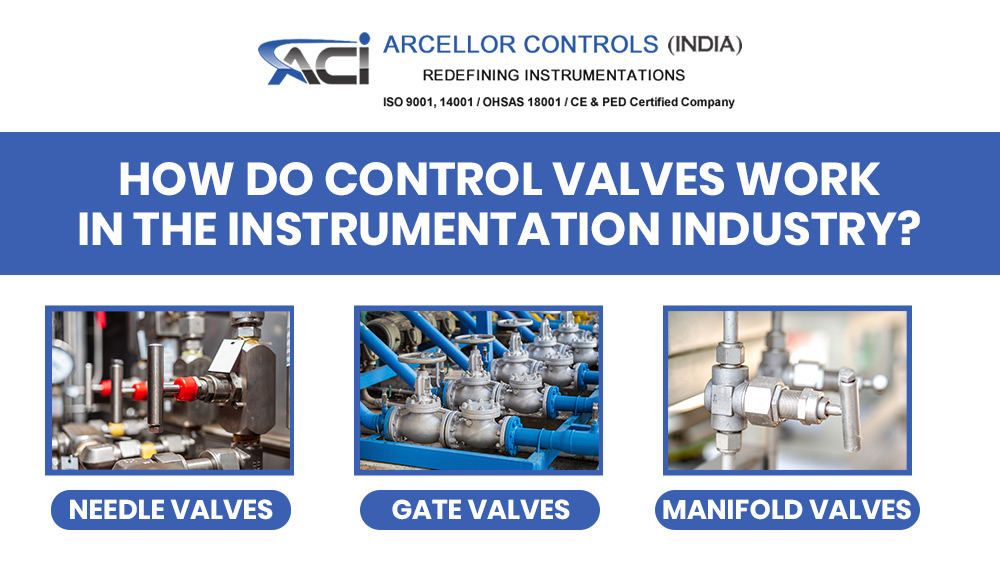Welcome to Arcellor!
Call us 8:00am - 8:00pm
079-2273 3345 / 6353949804
Monday to Friday
8:00am - 8:00pm

How do control valves work in the instrumentation industry?
Control valves are essential components in the instrumentation industry that regulate the flow of fluids and gases in a system. They are widely used in various industries such as oil and gas, chemical, pharmaceutical, and more. As the leading valve manufacturer, and exporter in India, Arcellor Controls India provides a comprehensive range of instrumentation valves suitable for various applications.
In this article, we will discuss how control valves work in the instrumentation industry and the types of valves used in instrumentation.
Understanding Controls Valve
Control valves are devices that control the flow of a fluid or gas in a system. They achieve this by changing the size of the opening through which the fluid passes. This change in opening size can either increase or decrease the flow rate of the fluid.
Control valves are made up of two main components – the actuator and the valve body. The actuator is responsible for moving the valve’s internal mechanism, which in turn controls the fluid flow. The valve body contains the internal mechanism, which can either be a globe, ball valve, or butterfly valve.
Types of Valves in Instrumentation
There are several types of valves used in instrumentation, including:
- Ball valves: A ball valve is a quarter-turn valve with a hollow, perforated, or pivoting ball that controls the flow. It is ideal for applications where a quick shutoff is necessary.
- Globe valves: A globe valve is a linear motion valve used to regulate flow. It has a globe-shaped body and a movable disk-type element that opens or closes the flow path by moving up or down.
- Needle valves: A needle valve is a type of valve with a slender, tapered point at the end of a threaded stem. It provides precise flow control in low-flow applications.
- Gate Valves: A gate valve is a linear motion valve used to control the flow of fluids. It has a gate or wedge-shaped disk that moves perpendicular to the flow path to open or close the valve. It is commonly used in applications that require tight shutoff.
- Manifold Valves: A manifold valve is a type of valve used to isolate and control the flow of fluids in a piping system. It consists of multiple valves connected to a common manifold, allowing multiple flows to be controlled at once.
- Check Valves: A check valve is a type of valve that allows fluid to flow in one direction only, preventing backflow. It is commonly used to prevent pump damage, water hammer, and reverse flow.
- Monoflange Valves: A mono-flange valve is a compact, all-in-one valve assembly used to replace traditional multiple-valve installations in instrumentation and piping systems. It consists of a single block with one inlet, one outlet, and a single valve mechanism.
- Valves Accessories: Valve accessories are additional components that can be attached to a valve to enhance its performance, safety, and functionality. Some examples of valve accessories include actuation systems, position indicators, limit switches, and pressure regulators.
Components of Control Valves
Control valves typically consist of three main components:
- Valve body: This is the main housing of the valve and is typically made of metal only.
- Actuator: The actuator is the component that drives the valve’s movement, and there are various types of actuators used in control valves, such as pneumatic, electric, and hydraulic actuators.
- Positioner: This component is used to ensure the valve is accurately positioned based on the control signal.
How to Do Control Valves Work?
The operation of a control valve depends on its type and mode of operation. In general, control valves work by controlling the fluid flow through the valve body. The mode of operation of a control valve can either be open-loop or closed-loop.
In open-loop control, the valve is controlled by a person or an external signal. The operator or signal sets the desired flow rate, and the valve adjusts the flow rate accordingly. In closed-loop control, the valve is controlled by a feedback loop that continuously measures and adjusts the flow rate based on a set point.
In automatic control, the valve actuator is controlled by an external signal such as an electrical signal or a pneumatic signal. The signal is sent to the actuator, which moves the valve to adjust the fluid flow.
Control Valve Sizing
Proper sizing is critical for the efficient and effective operation of control valves. As we offer valve sizing equations and software to help customers select the appropriate valve size based on specific application requirements, such as flow rate, pressure drop, and fluid properties.
Control Valve Maintenance
Regular maintenance is essential to ensure the long-term reliability and performance of control valves. Arcellor Controls India offers maintenance services for their valves, including lubrication, inspection, calibration, and repair or replacement.
Application of Valves
Our range of instrumentation valves is versatile and can be used across numerous fields of industry. They are compatible with a variety of applications.
- Chemical & Petro-Chemical Processing
- Oil & Gas: Exploration, Offshore, Onshore, Refining & Production
- Medical, Pharmaceuticals & Bio-Technology
- Power Generation/Power Plants
- Food and Beverage Industries and so on.
Final Words!..
Instrumentation valves, including control valves, play a vital role in various industries. With the wide range of instrumentation valves offered by Arcellor Controls India, customers can find the right valve for their specific application needs. Proper valve sizing and maintenance are critical to ensure optimal valve performance and long-term reliability. Explore the high-quality range of Instrumentation Valves today!
Get in Touch
You will find yourself working in a true partnership that results in an incredible experience, and an end product that is the best.





Post A Comment